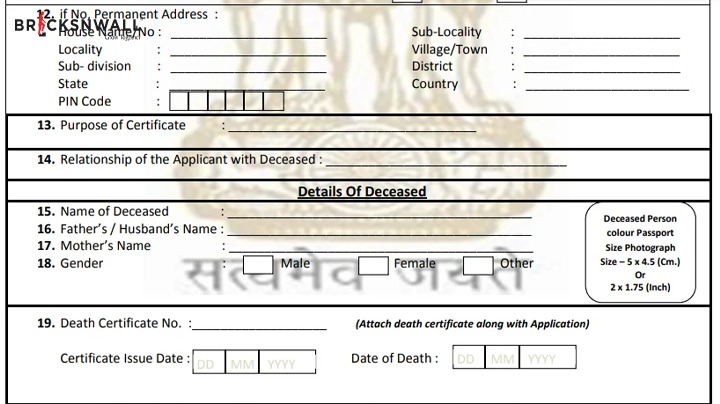Why is a legal heir certificate important, and what does it mean?
Bricksnwall Trusted Experts

People battling in court to maintain their portion
of inherited land or to be named as the property's sole legitimate successor
are stories we frequently read about. But when a real estate owner passes away
intestate—that is, without writing a will outlining their intentions about the
property's distribution—things can become even more convoluted. In these
situations, the surviving family members must obtain formal documents such as
the Succession Certificate or Legal Heir Certificate in order to take on the
owner's obligations and be granted the authority to make decisions on their
behalf.
When it becomes difficult for someone without legal
training to comprehend the Indian Constitution's actions and what all the
technical jargon signifies, they frequently find themselves in a difficult
situation. One such contentious issue that requires clarification is a legal
heir certificate. Learn more about legal heirs and how to obtain a legal heir
certificate by reading on.
As per the laws governing succession, an heir is a
person who inherits all the materialistic goods and duties, including debts
associated with real estate, when the deceased leaves no will or legal
clarification behind.
Legal heirs in India are divided into two groups:
Class I and Class II.
Hindu Succession Law class I heirs in equal share
for a Hindu guy
- His
spouse
- His
offspring
- His
mom
Class II heirs may inherit the property in the
event that Class I heirs are not present.
A Hindu man's class II heirs under Hindu
Succession Law are:
- His dad
- His
offspring
- His
grandchildren by great-grandchildren
- His
siblings
- Additional
family members
A Legal Heir Certificate: What Is It?
In accordance with Indian succession laws, a Legal
Heir Certificate is a crucial official document provided by government agencies
that aids in establishing the relationship between the departed individual and
their legal heirs. All of the deceased person's legal assets are transferred
to their surviving family members with the use of a legal heir certificate
india. Real estate and the transmission of financial claims through banks, such
as provident funds, house taxes, loans, electricity bills, current and savings
accounts, IT return filing, etc., require this certificate. Furthermore, when
an individual passes away intestate—that is, without leaving a will or
designating a legal nominee—a court-issued legal heirship certificate is
required.
Why Is a legal Heir Certificate Required?
The legitimate heir who assumes all of the deceased
person's assets and liabilities claims the Waris certificate. A certificate of
legal heirship is required to
Give a deceased person's belongings and properties
to their legal heir.
Make a claim on any active insurance plans.
sanction and obtain any family pension that the
dead worker's employer received through the proper processes.
Recover financial obligations from the government,
such as gratuities and provident payments.
Acquire any outstanding salary of the departing
worker who was employed by the federal or state governments.
Get hired as a result of any sympathetic
appointments.
It's advisable to request a legal heir certificate
if you're going to buy a property in order to verify who the true owner is.
What Benefits Come With Getting A Legal Heir
Certificate?
A document that attests to a deceased person's
legitimate heirs is called a legal heir certificate. It is a crucial document
that aids the heirs in claiming the possessions and assets the deceased left
behind. Here are some benefits of getting a legal heir certificate in India, thus
you should know how to apply for one:
- Legal
heir certificate: This document attests to the departed person's legal
heirs and serves as proof of legal heirship. To be eligible to receive the
assets and properties that the dead left behind, you must have this
paperwork.
- Simple
asset transfer: Are you still unsure if a legal heir certificate is
sufficient to transfer property? The original legal heir certificate
facilitates the simple transfer of the deceased's estate's assets. To
transfer the properties and assets to the rightful heirs, this certificate
is necessary.
- Prevents
legal disputes: There could be disagreements among the legal heirs
regarding the possessions and assets the deceased left behind if there
isn't a legal heir certificate. The legal heir certificate guarantees a
smooth succession and assists in preventing such problems.
- Helpful
in securing government benefits: The legal heir certificate can be used to
secure government benefits, including insurance, pensions, and other forms
of financial support.
How Does One Go About Obtaining a Legal Heir
Certificate?
You must get in touch with the district civil
court, corporation/municipality office, or Taluk Tehsildar in the relevant
location to obtain your legal heir certificate.
The legitimate successor of the dead must get in
touch with the appropriate authorities in their area and request the necessary
paperwork to apply for a legal heir certificate. The names, home addresses, and
relationships to the deceased of the legal heirs are all included in the application.
Could you please send this application to the government officials after
filling it out as accurately as possible? For the same, you can also employ an
attorney to represent you at the district civil court.
The application must be submitted with all required
documentation, including the deceased owner's death certificate. The death
certificate needs to be obtained from the corporation/municipality office if
you don't already have it.
The application for a legal heir certificate must
be filed with an affidavit on stamp paper or a self-declaration.
We take note of your inquiry and send an
administrative officer or revenue inspector to get comprehensive information.
The legal heirship certificate was granted by the
relevant authorities as soon as the inspection was finished and deemed
successful.
The time it takes to submit an application and get
the legal heir certificate is typically thirty days. However, you must contact
the Revenue Division Officer (RDO) or the local sub-collector if you encounter
an unavoidable unforeseen delay.
What Records Are Required in Order to Get a Legal
Heir Certificate?
In order to receive a legal heir certificate from
the Indian government, you need to make sure that the application is submitted
with the following documents:
Application: complete, signed, and with correct
information.
- Proof
of address or identity of the applicant. The applicant's Aadhar card,
driver's license, voter ID card, passport, or any other identity card
issued by the Indian government could be used as identification. Any valid
ID, a gas bill, a phone or mobile bill, a passbook, etc., can serve as
address verification.
- The
deceased owner's death certificate. You can get it from the office of the
corporation or municipality.
- Proof
of each legitimate heir's birthdate. It could be a birth certificate,
passport, PAN card, school transfer, leaving certificate, etc.
- Refer
to the owner's proof of death.
- An affirmation of self-undertaking.




